Insolvency can be a daunting experience for any business. When faced with financial distress, the right legal guidance is crucial to navigate the complexities of insolvency law. Selecting an experienced insolvency lawyer can significantly impact the outcome for your company. This article explores the top traits that define the best insolvency lawyers, ensuring that your business receives the support it needs during challenging times.
Expertise in Insolvency Law
One of the most essential traits of an effective insolvency lawyer Sydney is their expertise in insolvency law. This specialised knowledge is crucial for understanding the various legal frameworks that govern insolvency proceedings.
Comprehensive Knowledge of Legislation
The best insolvency lawyers possess a thorough understanding of both federal and state legislation. They stay updated on changes in laws and regulations that may affect your case. This knowledge allows them to provide informed advice tailored to your specific situation.
In addition to statutory knowledge, a skilled insolvency lawyer will also be well-versed in relevant case law and judicial precedents. This depth of understanding enables them to anticipate potential challenges and devise strategies that align with the latest judicial interpretations. Furthermore, their ability to interpret complex legal jargon into layman’s terms can significantly ease the stress for clients navigating the often daunting landscape of insolvency.
Experience with Various Insolvency Procedures
Insolvency law encompasses a range of procedures, including voluntary administration, liquidation, and receivership. A proficient lawyer will have experience in all these areas, enabling them to guide your company through the most appropriate process. Their familiarity with different scenarios allows for strategic decision-making that can safeguard your interests.
Moreover, the nuances of each procedure can vary greatly, and an experienced lawyer will recognise the subtle distinctions that can make a significant difference in outcomes. For instance, they will understand when it is more advantageous to pursue a voluntary administration to restructure debts rather than opting for immediate liquidation. This strategic insight can often lead to more favourable resolutions, potentially preserving business assets and jobs, which is particularly important in a tight-knit community where businesses rely on one another for support.
Strong Negotiation Skills
Insolvency often involves negotiations with creditors, stakeholders, and other parties. Strong negotiation skills are, therefore, a vital trait for any insolvency lawyer. They must be able to advocate effectively on behalf of your company while maintaining a level of professionalism and diplomacy. This requires not only an understanding of the legal framework surrounding insolvency but also a keen sense of timing and the ability to read the room. A skilled negotiator knows when to push for a better deal and when to concede, ensuring that the process remains constructive and focused on achieving a satisfactory outcome for all parties involved.
Ability to Build Relationships
Successful negotiations often hinge on the ability to build and maintain relationships. An effective insolvency lawyer understands the importance of fostering positive connections with creditors and stakeholders. This rapport can lead to more favourable outcomes, as parties are often more willing to cooperate with someone they trust. Furthermore, strong relationships can facilitate open communication, which is essential in navigating the complexities of insolvency. A lawyer who has established credibility and mutual respect is more likely to receive honest feedback and insights from creditors, which can be invaluable in crafting a strategy that addresses the concerns of all involved.
Strategic Thinking
Negotiation is not just about arguing points; it requires strategic thinking. The best insolvency lawyers can assess situations quickly and devise strategies that align with your company’s goals. They are adept at identifying potential compromises that can satisfy all parties involved, ultimately leading to a resolution that minimises losses. This strategic mindset also involves anticipating the responses and tactics of the opposing side, allowing the lawyer to prepare counterarguments and alternative proposals that can keep negotiations on track. By employing a forward-thinking approach, an insolvency lawyer can navigate the often turbulent waters of financial distress with agility and foresight, ensuring that your company remains in the best possible position throughout the process.
Excellent Communication Skills
Clear and effective communication is paramount in any legal matter, especially in the realm of insolvency. The best lawyers possess exceptional communication skills, ensuring that all parties understand the complexities of the situation.
Clarity in Explanation
An experienced insolvency lawyer can break down complex legal jargon into understandable terms. This clarity is essential for business owners who may not have a legal background. By explaining the implications of various options, they empower clients to make informed decisions. Furthermore, a skilled lawyer will often use real-world examples and case studies to illustrate potential outcomes, making the information more relatable and easier to digest. This approach not only enhances understanding but also helps to alleviate the anxiety that often accompanies insolvency issues, allowing clients to feel more secure in their choices.
Proactive Updates
Insolvency proceedings can be lengthy and complicated. A good lawyer keeps clients informed throughout the process, providing regular updates and promptly addressing any concerns. This proactive approach fosters trust and confidence, allowing business owners to focus on other aspects of their operations. Additionally, a lawyer who is attentive to their client’s needs will anticipate questions that may arise and address them before they become pressing issues. By maintaining open lines of communication, they create an environment where clients feel comfortable discussing their worries and seeking guidance, ultimately leading to a more collaborative and effective legal partnership.
Empathy and Understanding
Facing insolvency can be an emotional and stressful experience for business owners. The best insolvency lawyers demonstrate empathy and understanding, recognising the human side of legal proceedings.
Supportive Approach
An empathetic lawyer will listen to their client’s concerns and provide reassurance during difficult times. They understand the weight of financial distress and strive to offer support beyond just legal advice. This supportive approach can make a significant difference in how clients cope with the challenges they face. By fostering a safe space for open dialogue, these lawyers enable their clients to express their fears and uncertainties, allowing for a more comprehensive understanding of their situation. This emotional support can be invaluable, as it helps clients feel less isolated in their struggles and more empowered to make informed decisions about their future.
Tailored Solutions
Every business is unique, and a one-size-fits-all approach rarely works in insolvency matters. The best lawyers take the time to understand the specific circumstances of each case, tailoring their strategies to meet the individual needs of their clients. This personalised attention can lead to more effective outcomes. For instance, a lawyer may explore various options such as restructuring, negotiations with creditors, or even alternative dispute resolution methods, all while considering the long-term vision of the business. By doing so, they not only address the immediate financial concerns but also help clients to envision a pathway to recovery and sustainability, which can be a crucial aspect of maintaining morale during such trying times.

Proven Track Record
When selecting an insolvency lawyer, it is essential to consider their track record. A lawyer with a history of successful outcomes in insolvency cases is likely to have the skills and experience necessary to handle your situation effectively. Click here to learn about why you might need Insolvency Lawyers Canberra for cross-state insolvencies.
Client Testimonials and Reviews
One way to gauge a lawyer’s effectiveness is by looking at client testimonials and reviews. Positive feedback from previous clients can provide insight into the lawyer’s capabilities and the level of service they provide. This information can be invaluable in making an informed decision.
Case Studies and Success Stories
In addition to testimonials, reviewing case studies or success stories can further illustrate a lawyer’s expertise. Understanding how they have navigated similar situations in the past can give potential clients confidence in their abilities. A proven track record speaks volumes about a lawyer’s competence and reliability.
Accessibility and Responsiveness
In times of financial distress, having an accessible lawyer is crucial. The best insolvency lawyers prioritise communication and are responsive to their clients’ needs.
Availability for Consultations
Accessibility means being available for consultations when clients need them. Whether through in-person meetings, phone calls, or emails, a responsive lawyer ensures that clients can reach out whenever necessary. This availability can alleviate some of the stress associated with insolvency proceedings.
Timely Responses
Insolvency matters often require quick decision-making. A lawyer who responds promptly to queries and concerns can help clients navigate the process more effectively. Timely communication can prevent misunderstandings and ensure that all parties are on the same page.
Analytical and Problem-Solving Skills
Insolvency cases often present complex challenges that require analytical thinking and problem-solving skills. The best insolvency lawyers excel in these areas, enabling them to devise effective solutions tailored to their clients’ circumstances.
Critical Thinking
Analytical skills allow lawyers to assess situations critically and identify potential risks and opportunities. This critical thinking is essential for developing strategies that can mitigate losses and protect the interests of the business.
Creative Solutions
Insolvency law can be intricate, and traditional approaches may not always yield the best results. The best lawyers think outside the box, offering creative solutions that can address unique challenges. This innovative mindset can lead to more favourable outcomes for clients.
Ethical Standards and Integrity
Ethics and integrity are fundamental traits for any lawyer, particularly in the sensitive area of insolvency. The best insolvency lawyers adhere to high ethical standards, ensuring that their actions are always in the best interests of their clients.
Transparency in Fees
Clients should always be aware of the costs associated with legal services. A reputable insolvency lawyer provides clear information regarding their fees and any potential additional costs. This transparency builds trust and allows clients to budget effectively for legal expenses.
Commitment to Client Interests
Integrity means prioritising the client’s interests above all else. The best insolvency lawyers advocate fiercely for their clients while maintaining ethical boundaries. This commitment to client interests fosters a strong attorney-client relationship built on trust and respect.

Conclusion
Choosing the right insolvency lawyer can make a significant difference in the outcome of your company’s financial challenges. By focusing on the traits outlined in this article, business owners can identify the best legal representation for their needs. From expertise in insolvency law to strong negotiation skills and a commitment to ethical standards, these qualities are essential for navigating the complexities of insolvency effectively.
As companies face increasing financial pressures, having a skilled insolvency lawyer by your side is more important than ever. By investing time in selecting a lawyer who embodies these traits, businesses can better position themselves for recovery and future success.



